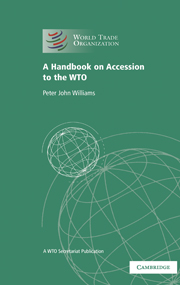Book contents
- Frontmatter
- Contents
- List of boxes and tables
- Foreword
- List of abbreviations and acronyms
- Introduction and summary
- Chapter 1 Accession in perspective
- Chapter 2 The basic rules
- Chapter 3 Technical assistance and training for acceding countries
- Chapter 4 The accession process: the procedures and how they have been applied
- Chapter 5 Substance of accession negotiations
- ANNEXES
Chapter 3 - Technical assistance and training for acceding countries
Published online by Cambridge University Press: 05 March 2012
- Frontmatter
- Contents
- List of boxes and tables
- Foreword
- List of abbreviations and acronyms
- Introduction and summary
- Chapter 1 Accession in perspective
- Chapter 2 The basic rules
- Chapter 3 Technical assistance and training for acceding countries
- Chapter 4 The accession process: the procedures and how they have been applied
- Chapter 5 Substance of accession negotiations
- ANNEXES
Summary
Accession to the WTO is a complex process and all acceding governments need expert advice to master the WTO rules and obligations, the procedures governing the accession negotiations, the demands that the process makes of them and how to respond to these demands. Applicants are also ipso facto participants in the negotiations under the Doha Development Agenda and need to keep abreast of the issues being dealt with there, as they will be expected to accept the results of these negotiations when they become WTO Members.
The WTO provides trade-related technical assistance and training to acceding LDCs, developing countries and low-income countries in transition within its area of competence. Its main purpose has been to assist these applicants to better understand and implement WTO obligations and to exercise their rights under the WTO agreements once they become Members of the Organization. The system recognizes the special needs of least-developed countries. The priority accorded to TRTA for acceding LDCs was made explicit in the Doha Declaration, where Ministers “instruct the Secretariat to reflect the priority that [they] attach to LDC accession in the annual plans for technical assistance” and in the Guidelines for the Accession of LDCs.
WTO agreements are designed to make a substantial contribution to economic development but it is up to traders to translate the opportunities created by these agreements into increased trade. The WTO does not itself provide TRTA to address supply-side issues, such as the difficulties that new Members may have in producing goods and services of exportable quality and getting them to export markets, but cooperates with other providers of TRTA active in this area.
- Type
- Chapter
- Information
- A Handbook on Accession to the WTOA WTO Secretariat Publication, pp. 16 - 23Publisher: Cambridge University PressPrint publication year: 2008
- 1
- Cited by

